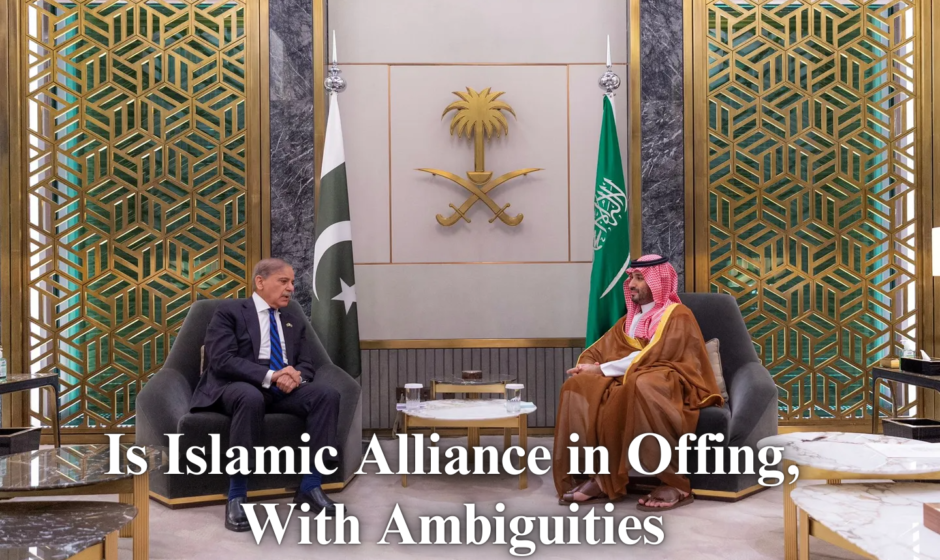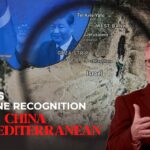Only a true test, a moment of crisis, will reveal whether this new alliance is as ironclad as advertised, or more of a strategic signal than a binding shield.
Rahul Pawa
When Saudi Arabia and Pakistan signed a sweeping mutual defense agreement in Riyadh this month, it marked a strategic pivot. The agreement, termed a “Strategic Mutual Defence” agreement declares that an attack on one is an attack on both, echoing NATO’s famous Article 5 commitment. It’s an unprecedented pledge between the guardian of Islam’s holiest sites and the only Muslim nation armed with nuclear weapons. Yet behind the celebratory rhetoric, the agreement’s true scope and weight remain uncertain.

A NATO-Style on paper, the agreement’s collective defense vow is explicit: “any aggression against either country shall be considered an aggression against both” Pakistan’s government said. In practice, much is left vague. Notably, the agreement is silent on whether Pakistan’s nuclear arsenal, the Islamic world’s only nukes is now at Saudi Arabia’s disposal. Pressed about a potential Pakistani “nuclear umbrella” for Riyadh, a senior Saudi official would only say the agreement “encompasses all military means”. This careful ambiguity hints at a broad commitment while stopping short of any explicit nuclear guarantee.
Another grey area is the agreement’s status. Riyadh and Islamabad pointedly call it an “agreement” and not a treaty. By definition, though, any written inter-state accord intended to bind is a treaty under international law, regardless of its label. The absence of a published text and the flexible wording suggest the parties prefer some wiggle room.
Saudi Arabia has pursued grand defense coalitions before like a 2015 pan-Islamic military alliance against terrorism that proved “more symbolic than operational”. This time, the language of collective defense is tied to plans for concrete cooperation (joint exercises, intelligence-sharing, arms training). Whether it matures into a robust alliance or remains largely aspirational will only be clear with time.
The agreement’s timing is telling. It came days after a surprise Israeli airstrike in Doha, Qatar that killed Hamas figures and stunned the Gulf States. Qatar hosts a major US airbase, yet Washington did not prevent the strike, a jolt to regional confidence in American protection. Saudi Arabia, already uneasy about U.S. reliability, seized the moment to bolster its own security. Officially, Riyadh says the deal “institutionalises” long-standing cooperation rather than targeting any specific incident. Still, it unmistakably signals that the kingdom can seek safeguards beyond the U.S. umbrella.
The agreement even revived talk of an “Islamic NATO.” Saudi Arabia binding itself to Pakistan, Islam’s spiritual heart partnering with its only nuclear-armed state is a powerful image. Observers speculate that other Muslim countries might one day align under a similar framework. Yet longstanding sectarian and political rifts (Sunni vs Shia, Arab vs non-Arab) have doomed past unity efforts. For now, the Riyadh-Islamabad agreement is as much a message to big powers as a foundation for any broader alliance.
Perhaps the toughest diplomatic test for Riyadh is managing the agreement’s fallout in New Delhi. India has spent years cultivating Saudi Arabia as a partner, a top source of oil, investment and Islamic-world backing on contentious issues. A formal Saudi-Pakistani security link is exactly what India hoped to avoid. New Delhi “would not welcome an explicit security tether between its principal energy supplier and its strategic rival,” one analysis noted. In effect, the agreement edges Saudi Arabia closer to Pakistan, risking awkward strain in Saudi-India ties.
Indian government reacted in measured tones, acknowledging the agreement and saying it would “study the implications” for her security. The real worry in New Delhi is not that Saudi forces would fight on Pakistan’s side which remains far-fetched but that Pakistan will feel politically bolstered by Riyadh’s backing. Pakistani hardliners may adopt a tougher posture in future confrontations, believing a wealthy Arab power has their back. There’s also concern that Saudi aid or arms could flow to Pakistan over time, indirectly strengthening India’s longtime foe.
Aware of these optics, Saudi officials have been quick to reassure India. One senior official stressed that Saudi’s relationship with India “is more robust than it has ever been” and vowed to keep deepening it. Riyadh clearly wants to show it can defend its interests with Pakistan without abandoning its friendship with India. Even so, the balancing act is delicate. New Delhi will likely respond by tightening its own strategic bonds, for instance, with Israel, a close defense partner – and by quietly urging Riyadh to stay neutral in South Asian issues. Much progress in India-Saudi relations has come in recent years, and both sides have incentives to prevent this new alignment from derailing that momentum.
As the dust settles, the Saudi–Pakistan agreement stands as a bold statement, but one not yet tested by crisis. Its ripple effects are already evident. Israel, which had been inching toward a historic normalisation with Riyadh, now sees that prospect put on hold Washington, too, must grapple with a Gulf ally hedging its bets on security.
Ultimately, the agreement’s significance will hinge on how seriously Riyadh and Islamabad implement it. Regular joint drills coordinated planning or clear mutual defense protocols could turn the promise into genuine deterrence. Absent that, skeptics may view it as more posturing than substance. History offers caution: Pakistan’s past defense agreement s (such as Cold War alliances with the U.S.) often fell short when real wars loomed, and Gulf unity schemes have tended to fragment under pressure.
For now, Saudi Arabia has made a dramatic bid to diversify its security options, a gamble on Pakistan’s reliability and on charting a more independent course without alienating old partners. If the gamble succeeds, it could redraw the strategic map of the Middle East and South Asia. If it falters, it will remind everyone that even grand agreements can carry unspoken caveats. Only a true test, a moment of crisis will reveal whether this new alliance is as ironclad as advertised, or more of a strategic signal than a binding shield.
(Rahul Pawa is director, research at New Delhi based think tank Centre for Integrated and Holistic Studies)Is Islamic Alliance in Offing, With Ambiguities



